Digital Financial Inclusion
ebook ∣ Revisiting Poverty Theories in the Context of the Fourth Industrial Revolution · Palgrave Studies in Impact Finance
By David Mhlanga

Sign up to save your library
With an OverDrive account, you can save your favorite libraries for at-a-glance information about availability. Find out more about OverDrive accounts.
Find this title in Libby, the library reading app by OverDrive.



Search for a digital library with this title
Title found at these libraries:
| Library Name | Distance |
|---|---|
| Loading... |
This book is unique in that it challenges scholarly views on financial inclusion and poverty reduction while also relating financial inclusion and poverty reduction to the Fourth Industrial Revolution. The book deviates from the usual method of analyzing financial inclusion, which relies on bank accounts or microcredit as success criteria, and instead discusses how the Fourth Industrial Revolution is facilitating digital financial inclusion. With a five-fold goal, this book investigates both past and present readings and understandings of poverty and financial inclusion. To begin, it provides a thorough introduction to the Fourth Industrial Revolution and financial inclusion in the context of the Fourth Industrial Revolution. Second, the book dives quite extensively into the theories of financial inclusion in the context of the Fourth Industrial Revolution. Third, the book reconstructs the theory of financial inclusion, moving from traditional to digital financial inclusion, highlighting the role of digital financial inclusion in the transition from an informal financial money market to a formal financial system. The fourth goal is to evaluate the tools and effects of digital financial inclusion on poverty. Finally, it provides case studies of digital financial inclusion and the future of digital financial inclusion in emerging and developing countries. This book will be of interest to academics, students and practitioners in a range of disciplines, including finance, development economics, and consumer economics.







